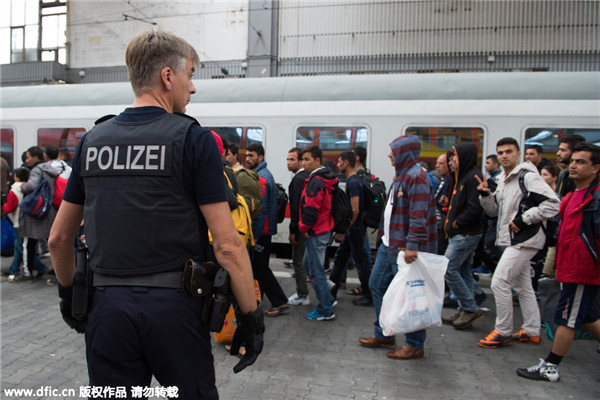Germany re-imposes border controls to slow migrant arrivals
Updated: 2015-09-14 07:29
(Agencies)
|
|||||||||||
 |
|
Police escort refugees to a train bound for Dortmund at the main railway station on Sept 13, 2015 in Munich, Germany. [Photo/IC] |
Germany, Europe's largest and richest economy, has become a magnet for migrants making journeys by sea and land, often via Turkey and the Greek islands, and then onwards through the Balkans, Hungary and Austria. Police said around 13,000 arrived in the southern German city of Munich alone on Saturday, and another 3,000 on Sunday morning.
Now Germany has joined smaller and poorer countries such as Greece and Hungary that are struggling to manage the huge flow of desperate people.
As trains for Germany were stopped, groups of refugees and migrants camped out in an underground carpark in the Austrian city of Salzburg, near the border. Traffic backed up along one of the highways between the two countries.
Austrian news agency APA quoted Chancellor Werner Faymann as saying that Vienna would not introduce additional border controls for now but the effect of Germany's decision on Austria was hard to predict.
Trains from Austria to Germany would be stopped until 5:00 am (0300 GMT) on Monday, the interior minister of the state of Bavaria said. A Reuters photographer also saw a German police checkpoint on one of the Austrian roads into Germany.
Berlin made clear it wanted EU partners to share the burden of welcoming thousands of refugees.
"It's true: the European lack of action in the refugee crisis is now pushing even Germany to the limit of its ability," Economy Minister Sigmar Gabriel, who is also vice-chancellor, told the website of Der Tagesspiegel newspaper.
With large numbers of migrants stuck in squalid and chaotic conditions on European borders, or trudging along the side of motorways, Merkel last weekend stopped enforcing the EU's "Dublin" rules under which asylum seekers should register in whichever member state they first arrive in.
De Maiziere defended her decision but insisted the Dublin rules were still valid. "We need to quickly return to orderly procedures now," he added. "We can't allow refugees to freely choose where they want to stay - that's not the case anywhere in the world."
Most asylum seekers are refusing to stay in the poorer southern European countries where they arrive, such as Greece, and are instead making their way to Germany or Sweden where they anticipate a warmer welcome. Many Germans have greeted the arrivals with cheers and volunteers are flooding in to help.
Related Stories
US plans to increase refugee intake next year 2015-09-10 09:14
Backgrounder: Refugee crisis in Europe 2015-09-09 21:01
Western countries urge more US response on refugee crisis 2015-09-07 15:15
Refugee crisis is bitter fruit of West's policy: Opinion 2015-09-07 07:52
Refugee crisis challenges conscience of the West 2015-09-07 07:39
Today's Top News
Border-free Europe unravels in migrant crisis
Refugee crisis: Germany re-imposes border controls
Australia gets new PM as Abbott loses out to rival Turnbull
Egyptian security forces shoot at Mexican tourist convoy, kill 12
Thousands flee California wildfire as homes go up in flames
Slow growth may spur more support
British MPs reject assisted dying bill
Chinese nuclear plant may be built in UK sooner than planned
Hot Topics
Lunar probe , China growth forecasts, Emission rules get tougher, China seen through 'colored lens', International board,
Editor's Picks

|

|

|

|

|

|






